Table of Contents
Have you ever found yourself falling asleep while sitting, head nodding in agreement with the rhythm of your snores? You’re not alone. In this bustling era where coffee is a more reliable companion than sleep, many of us wonder, why can’t I stay awake even during the most crucial moments?
From the sneaky nap attacks while binge-watching your favorite show to the embarrassing doze-off during meetings – this article dives into the whys and hows of falling asleep while awake. Besides, we’ve covered you with practical tips and professional insights to stay alert.
Constantly falling asleep when sitting: Possible causes
Ever wondered, while slumped over your desk or dozing off mid-conversation, “Why can’t I stay awake?” or “Why am I falling asleep when I sit down”? It’s like your body hits the snooze button without your permission. Here, we look into the often-overlooked reasons behind this pesky problem.
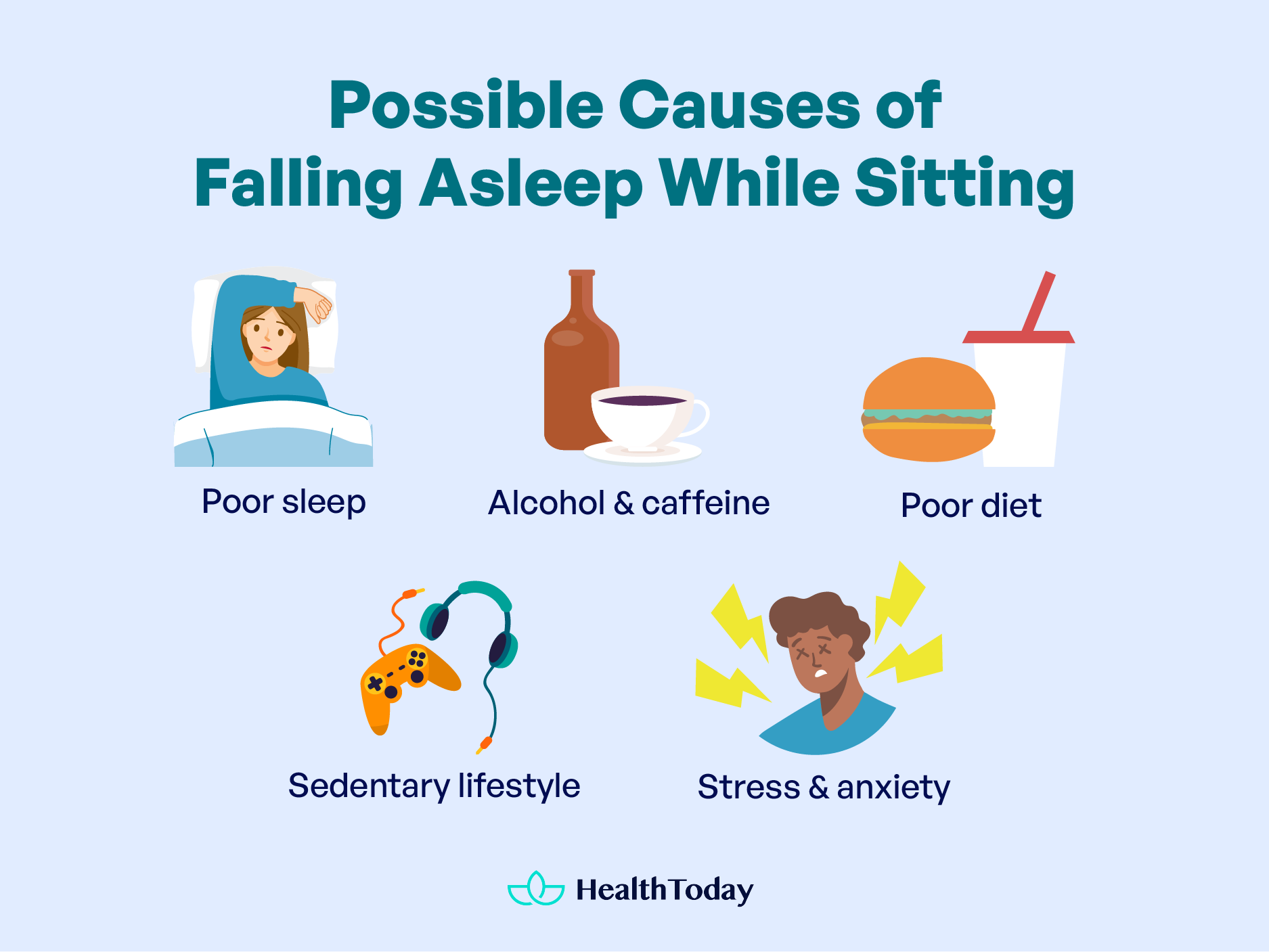
Poor sleep
Imagine sleep as your body’s night-shift worker. When you’re snoozing, it’s busy repairing cells and rejuvenating your brain. This is why a solid night’s sleep leaves you feeling like a champ in the morning.
But if sleep quality dips, this restoration process gets hit, leaving you dragging your feet during the day (1, 2).
It’s not just about getting enough hours of sleep; it’s also about how well you sleep. Insomnia, that pesky condition that makes it hard to fall or stay asleep, can rob you of quality rest, leading to those midday crash-and-burn moments.
Some medical issues like sleep apnea and Circadian Rhythm Disorders can sneakily disrupt your sleep (3).
Sleep apnea, for instance, causes breathing to pause periodically throughout the night. It’s like playing a not-so-fun game of red and green light with your oxygen supply, leading to fragmented sleep (4).
Circadian Rhythm Disorder messes with your internal clock, making your body and the outside world fall out of sync. It’s like being jet-lagged without traveling. Your body is confused about when to be awake and when to be asleep, causing a lot of daytime sleepiness (3).
Alcohol and caffeine
Alcohol and caffeine may also be a reason for your sleepiness.
A drink might seem like a shortcut to dreamland, but it’s a bit of a trickster. Initially, alcohol can make you drowsy due to its sedative effects, primarily by binding to GABA receptors and inhibiting glutamate, a primary excitatory neurotransmitter.
However, as the night progresses, it disrupts your sleep cycle. It increases levels of stress hormones like epinephrine and cortisol, leading to restless sleep and frequent awakenings. Further contributing to this rebound effect is that once the inhibitory effects of GABA are metabolized, the activating levels of Glutamate become induced (5). This interrupted sleep pattern can leave you feeling more tired the next day.
Besides affecting sleep quality, regular alcohol consumption can exacerbate sleep disorders like sleep apnea, leading to fragmented sleep and daytime fatigue (6, 7).
And caffeine – our go-to for a quick energy boost. It’s great for a short-term jolt of alertness, but overdoing it or timing it wrong (like having a coffee too late in the day) can backfire.
Caffeine can disturb your night’s sleep, reducing the total sleep time and affecting quality. Consequently, you might find yourself fighting off sleepiness the next day (8, 9).
Interestingly, while caffeine initially perks you up, its effects can wear off, leading to a slump. This crash can be severe if you’re already running low on sleep. Too much caffeine can also wreak havoc on the adrenal glands, which can cause more stress in the system.
It’s worth noting that people react differently to caffeine. For some, even a small amount can significantly impact sleep, while others might not be as sensitive (10).
Poor diet
Are you asking yourself, “Why do I randomly get sleepy?” Your diet might be playing a bigger role than you think.
Diets high in ultra-processed foods, especially those loaded with added sugars, can negatively impact your energy levels. These foods may disrupt your sleep cycle, leading to daytime sleepiness.
Among adolescents, excessive sugar intake has been linked to increased daytime sleepiness. This suggests that reducing sugary foods and drinks could help alertness throughout the day (11).
Studies have shown that diets with a higher proportion of complex carbohydrates- such as fresh fruits and vegetables, legumes or nuts, and anti-inflammatory fats are associated with better sleep quality.
Conversely, diets high in saturated fats and simple carbohydrates may contribute to poorer sleep and increased daytime sleepiness (12). This is because these foods can result in metabolic stress and inflammation, while nutrient-dense foods support regulating many of the body’s processes necessary for good sleep to occur.
Sedentary lifestyle
If you have a sedentary lifestyle, where most of your time is spent sitting or inactive, might seem comfortable, but it can affect your sleep.
Exercise isn’t just about staying fit; it’s a key player in sleep health. Engaging in physical activity aids in regulating our sleep patterns, ensuring we get restorative, deep sleep. The less we move, the more our sleep quality can suffer, making us prone to daytime drowsiness.
Our bodies are wired to a natural clock, the circadian rhythm, which balances our sleep and wake cycles. Regular movement helps keep this rhythm in check. Without it, our internal clock can get out of sync, leading to sleepiness at inappropriate times.
Various studies have drawn a line connecting sedentary behavior with sleep issues like insomnia. When we don’t sleep well at night, we’re more likely to feel sleepy during the day (13, 14).
A lack of movement can also contribute to metabolic problems like obesity. Obesity, in turn, is linked with sleep disorders such as sleep apnea, a common culprit behind excessive daytime sleepiness (15).
Stress and anxiety
At first glance, stress and anxiety might seem like conditions that would keep you alert rather than make you sleepy. However, the reality is more complex.
Chronic stress, in particular, can lead to continual exhaustion that can make it hard to stay awake.
Although stress is a normal part of life, it can become problematic when it turns chronic. Chronic stress can lead to a condition known as stress-related exhaustion disorder (ED). This disorder is marked by psychological and physical symptoms of exhaustion, with fatigue being a primary indicator (16).
Chronic stress doesn’t just wear your body down; it can also cause structural and functional changes in your brain.
These changes may contribute to chronic inflammation, which is another factor that can exacerbate symptoms like fatigue. It’s a bit like running a car engine on high for too long; eventually, the system needs to slow down. In our bodies, this manifests as a need to sleep.
Constantly nodding off while sitting could be due to several factors. It might be from bad sleep, sleep disorders, or your lifestyle. Too much alcohol, caffeine, junk food, not moving enough, or constant stress can make you feel more tired during the day.
Are you dealing with narcolepsy — A sleep disorder
Narcolepsy is a neurological condition where the brain struggles to regulate the sleep-wake cycle. This struggle makes people fall asleep throughout the day, often rapidly, which can become inconvenient.
Let’s explore the risk factors that might make someone more susceptible to this condition.
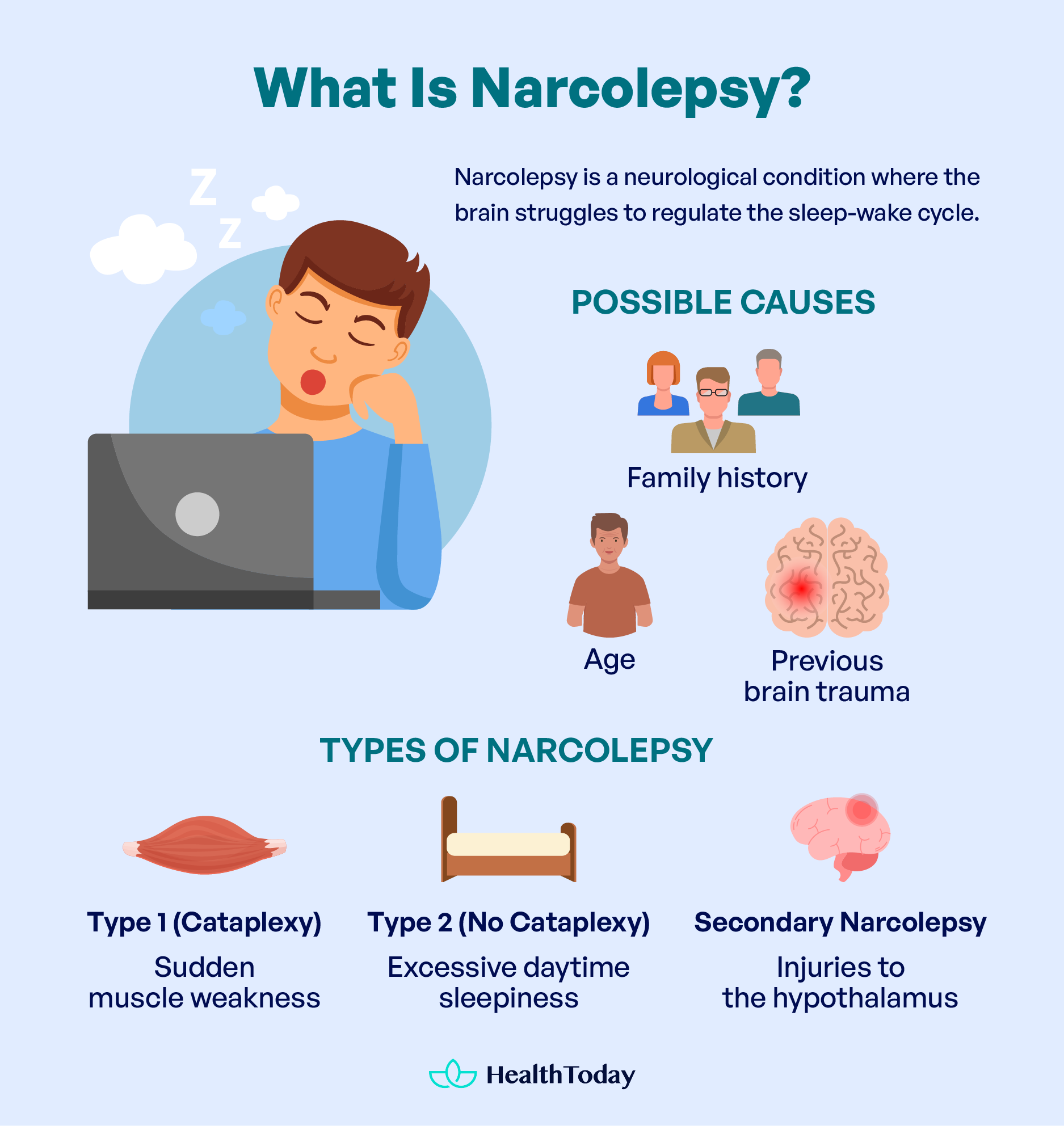
Family history
Genetics plays a significant role in narcolepsy. If a close family member, like a parent or sibling, has narcolepsy, your risk of developing the condition increases dramatically —up to 40 times. However, it’s important to note that familial cases of narcolepsy are relatively rare (17).
Age
Narcolepsy doesn’t discriminate much by age, but there are two notable peaks in diagnosis: around age 15 and again near age 36. Despite this, narcolepsy often remains underdiagnosed or misdiagnosed, leading many to live with unexplained symptoms of sleep during the day and awake at night (18).
Previous brain trauma
In rare cases, narcolepsy can develop after severe trauma to brain areas that regulate wakefulness and REM sleep. This includes instances of brain tumors, which might trigger the onset of narcolepsy symptoms.
Understanding the types of narcolepsy is key to recognizing its symptoms. There are two primary types of narcolepsy (19):
- Type 1 Narcolepsy (Narcolepsy with cataplexy): This type is characterized by low levels of a brain hormone called hypocretin or cataplexy (sudden muscle weakness) coupled with excessive daytime sleepiness. This form is more severe and often associated with emotional triggers.
- Type 2 Narcolepsy (Narcolepsy without cataplexy): People with Type 2 narcolepsy experience excessive daytime sleepiness but typically don’t have cataplexy. Their symptoms are less severe, and they have normal levels of hypocretin.
A rare form known as secondary narcolepsy can arise from injuries to the hypothalamus (20). This deep-brain region plays a crucial role in sleep regulation. Secondary narcolepsy is often accompanied by severe neurological problems, and individuals may experience prolonged sleep periods, fitting the description of sleep all day up all night disorder.
How do I know if my sleepiness is due to narcolepsy?
Narcolepsy is more than just feeling tired; it’s a specific pattern of symptoms that sets it apart from general tiredness or other sleep disorders. While a sleep specialist can determine if you have narcolepsy by taking a full medical history, let’s review the symptoms to help you know if your experience aligns with narcolepsy:
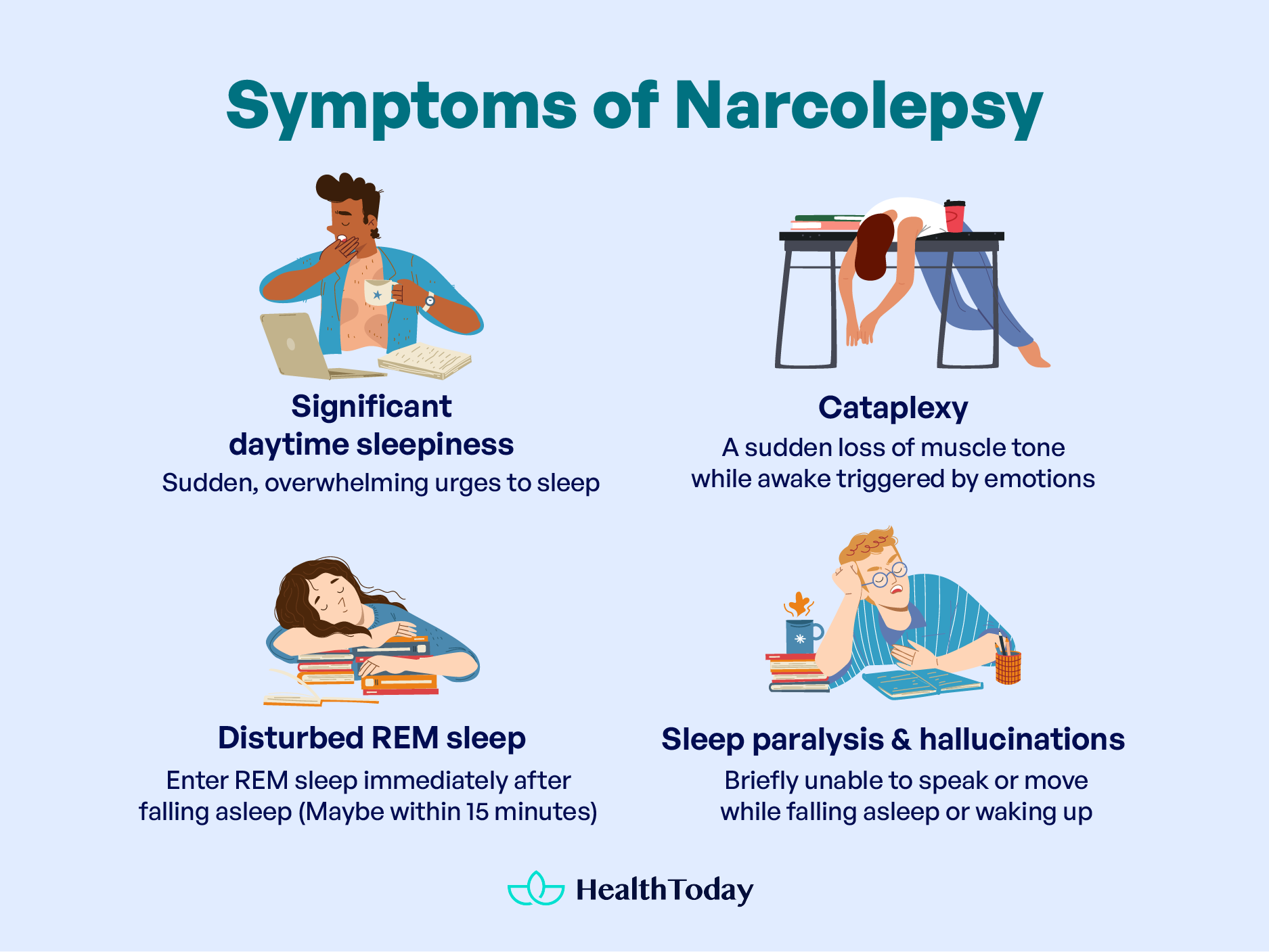
Significant daytime sleepiness
The hallmark of narcolepsy is excessive daytime sleepiness (EDS). This isn’t just about feeling drowsy; it’s characterized by sudden, overwhelming urges to sleep, leading to falling asleep throughout the day.
These ‘sleep attacks’ can occur regardless of how much sleep you got the night before, and they often come on quickly. Between these attacks, individuals may experience normal levels of alertness, especially when engaged in stimulating activities (21).
Cataplexy
A unique symptom of narcolepsy is cataplexy, a sudden loss of muscle tone while awake. It ranges from mild, such as slight drooping of the eyelids, to severe, resulting in a total collapse.
Intense emotions like laughter, fear, or excitement often trigger cataplexy. The frequency of these episodes can vary greatly among individuals, and in some cases, cataplexy may not appear until the late stage in the disease’s progression (22).
Disturbed REM sleep
People with narcolepsy experience poorly regulated rapid eye movement (REM) sleep. This means they might enter REM sleep almost immediately after falling asleep, sometimes within 15 minutes. REM sleep is typically when dreaming occurs and is characterized by loss of muscle tone.
Sleep paralysis and hallucinations
Sleep paralysis is another symptom where individuals can’t move or speak while falling asleep or waking up. These episodes are brief but can be quite distressing. Accompanying sleep paralysis, individuals might experience vivid, often frightening, hallucinations.
Narcolepsy is a sleep disorder where the brain can’t properly manage the sleep-wake cycle, leading to sudden and inconvenient daytime sleep attacks. Key factors like family history, age, and past brain trauma can increase the risk of developing narcolepsy. Its main symptoms include excessive daytime sleepiness, cataplexy (sudden muscle weakness), disturbed REM sleep, and sleep paralysis with hallucinations.
How do I stop myself from falling asleep while sitting? Home remedies
If you’re tired of fighting sleepiness during the day, it’s time to examine your night routine and see how to fix excessive sleepiness, which starts right at your bedtime habits and bedroom. Let’s dive into these home remedies that can help you more than just a good night’s sleep—they offer a new lease on energy and focus.
Building a nighttime routine
Creating a bedtime routine is like programming your body’s internal clock for better sleep, which can cure excessive sleepiness. Think of it as setting the stage for your brain to smoothly transition into sleep mode.
Start with a dedicated 30-minute wind-down before bed. This is your ‘me time’ to ease the day’s stress. Engage in quiet activities like reading a book or journaling – think of it as a soft landing for your brain. Avoid thrilling novels or intense memoirs; the goal is to calm your mind, not excite it.
Screening before bed is not good for your sleep. Blue light from devices tricks your brain into thinking it’s still daytime. Set a tech curfew about an hour before bed – yes, this means parting ways with your phone. If you must use a device, consider using blue-light-blocking glasses.
Listening to calming music or white noise can set a peaceful tone in your bedroom, making it easier to drift off.
You can incorporate gentle stretching, deep breathing, or yoga to relax your muscles and calm your mind. Also, meditation or mindfulness exercises can be a great way to manage wandering thoughts and ease into sleep.
A warm bath or shower before bed can work wonders. It sounds counterintuitive, but cooling down after a warm bath can make you sleepy. It mimics the body’s natural temperature drop before sleep.
Create an optimal sleep environment
Your bedroom environment is where the magic (or the science, really) of good sleep happens. The right environment can significantly enhance the quality of your sleep, laying the groundwork to cure excessive sleepiness.
By controlling light, temperature, and noise in your bedroom, you’re empowering yourself to stay awake and alert during the day.
Embrace the darkness
In a world where artificial light is everywhere, the power of darkness to induce sleep is often underrated.
Exposure to light, particularly the blue light from screens, can hinder melatonin production, the hormone that tells your brain it’s bedtime.
Research shows that even a small amount of light can disrupt your sleep and increase the risk of weight gain and other health issues (23).
So, what is the solution? Create a pitch-dark haven:
- Blackout curtains: Block out streetlights and moonlight.
- Dimming lights: Gradually reduce light to cue your body that it’s time to wind down.
- Tech-free zone: Limit screen time before bed to minimize blue light exposure.
Cool for comfort
Our body’s temperature naturally dips at night, signaling it’s time for sleep.
Maintaining a bedroom temperature around 65°F (18.3°C) aligns with this natural drop, aiding sleep onset.
Studies suggest warmer temperatures can lead to more wakefulness and lighter sleep, while cooler environments promote deeper sleep stages (24).
Create a cool room:
- Adjust the thermostat: A slight tweak can make a big difference.
- Warm baths or showers: Ironically, they help cool your body down afterward.
- Breathable bedding: Choose materials that help maintain a comfortable body temperature.
Quiet is key
Noise, particularly from urban environments, can significantly disrupt sleep. It can lead to more time spent in lighter sleep stages and trigger stress responses, reducing sleep quality (25).
Have quiet, peaceful sleep:
- Soundproof your space: Use rugs, heavy curtains, and window insulation to reduce external noise.
- Manage appliance sounds: Keep noisy appliances to a minimum.
- Earplugs: Simple yet effective for blocking out disruptive noises.
Exercise
Combatting unexpected sleepiness involves changing not only what you do at night but also how you live during the day.
A well-balanced diet and a regular exercise routine are powerful tools to cure excessive sleepiness.
First, regular exercise is good for your sleep. Studies have shown consistent physical activity can improve sleep quality and reduce anxiety (26).
A study on students during exam periods showed that those who maintained regular exercise reported better well-being, positive emotions, and improved sleep quality. This suggests that staying active can buffer the negative effects of stress on sleep (26).
But timing is key – exercising too late in the day can leave you too energized to fall asleep.
Ideally, you should work out during daylight hours and avoid intense physical activities three hours before bedtime. Morning or early afternoon workouts are optimal, aligning with your body’s natural energy peaks.
If evenings are the only time you can fit in a workout, opt for calming exercises like yoga or light stretching. Research indicates that people who exercise in the evening still enjoy good sleep quality, especially if the exercise is not too intense (27).
Diet
Regarding diet, there’s no one-size-fits-all for better sleep, but certain principles can guide you. A balanced, nutrient-dense diet can provide the nutrients needed for good sleep.
Here are some diet tips for better sleep:
- Mediterranean diet: This diet, known for its heart-health benefits, also correlates with better sleep. It’s rich in fruits, vegetables, and anti-inflammatory nutrients like salmon, nuts, and seeds and lower in saturated fat. The nutrient density and anti-inflammatory properties of this diet can support the body and brain with improved sleep.
While high in antioxidants, the Mediterranean diet also supports the health of the gut microbiome, which is also important in regulating many of the processes involved in sleep. In fact, studies suggest there is a bidirectional relationship between sleep and the composition of the gut microbiome. Compromised sleep can affect the quality and diversity of the gut microbiome, and similarly, imbalances of the gut microbiome can contribute to poor sleep (28).
- Moderate caffeine and alcohol: Caffeine and alcohol can disrupt sleep patterns. You should limit caffeine intake in the afternoon and evening and moderate alcohol consumption to get better sleep.
- Eating schedule: Try not to eat too late. Eating early in the evening can prevent digestion issues and acid reflux, which might disrupt sleep.
- Balanced diet: Studies indicate that diets high in protein and complex carbohydrates and low in saturated fats are associated with better sleep quality (29).
- Avoid heavy, spicy, or fatty foods late at night: These can cause discomfort and indigestion, making it harder to fall asleep.
How to cure excessive sleepiness: When to see your doctor?
Feeling sleepy occasionally after a late night is one thing, but constantly struggling to stay awake can signify something more serious.
Understanding when to seek medical advice is crucial in addressing and curing excessive sleepiness effectively.
When should I be concerned enough about this issue to see a doctor?
If feeling sleepy during the day becomes a norm, not an exception, it’s worth paying attention to other signals your body might be sending. Here are some red flags:
- Consistently long time to fall asleep: If it’s taking you more than 30 minutes to drift off night after night, it’s a sign something’s off.
- Perpetual fatigue and irritability: Feeling constantly tired and irritable during the day, even after a full night’s sleep, is a telltale sign.
- Frequent wakefulness at night: Regularly waking up in the middle of the night and staying awake for extended periods can disrupt your sleep cycle.
- Excessive daytime napping: If you need long or frequent naps during the day, it could indicate inadequate or poor-quality nighttime sleep.
- Inappropriate sleepiness: Falling asleep in situations when you need to stay awake, like reading or watching TV, is a clear warning sign.
- Relying on stimulants: If you need caffeine or other stimulants to stay awake throughout the day, it’s a red flag.
Before heading to your doctor, consider keeping a sleep journal. Record your sleep patterns, including how long it takes to fall asleep, how often you wake up at night, and the quality of your sleep.
Remember that daytime habits like caffeine or alcohol intake, medications, stress, exercise, and napping can affect your sleep. This journal can reveal patterns or behaviors impacting your sleep quality and provide valuable information for your doctor.
While a sleep journal is a great starting point, self-diagnosis has limits. Sleep disorders can be complex and often require professional evaluation.
If you notice a consistent pattern of sleep disturbances and daytime fatigue, it’s time to consult with a healthcare professional.
How a professional can help with sleep disorders
Doctors often use Cognitive Behavioral Therapy (CBT) to treat sleep disorders effectively. CBT is proven to be highly effective for insomnia and is often better than medication in the long run. It typically involves several sessions with a therapist (30).
What CBT Does:
- Cognitive part: Changes your negative thoughts about sleep.
- Behavioral part: Teaches you good sleep habits, like spending less time in bed and associating your bed with sleep.
- Relaxation techniques: Includes deep breathing and muscle relaxation to calm your mind.
Are there any side effects from the treatment?
When tackling excessive daytime sleepiness or narcolepsy, it’s crucial to consider the potential side effects of common treatments like medications.
Here’s a look at some typical prescriptions and their side effects (31):
- Zolpidem (Ambien): Often prescribed for insomnia, Zolpidem helps you fall asleep more easily. However, it can lead to side effects like dizziness, headache, and in rare cases, sleepwalking.
- Eszopiclone (Lunesta): This medication aids in longer sleep but can cause issues such as a metallic taste in the mouth, headache, and daytime drowsiness.
- Doxepin (Silenor): Used for sleep maintenance, Doxepin can cause dry mouth, nausea, and constipation. It’s less likely to cause dependence but should still be used cautiously.
- Diphenhydramine (Unisom, Benadryl): Commonly used for short-term sleep issues, Diphenhydramine can lead to drowsiness, dry mouth, and blurred vision. Long-term use can increase the risk of dementia and other cognitive issues.
It’s essential to work closely with your healthcare provider when considering these treatments.
When constant sleepiness disrupts your day, it’s time to consider seeing a doctor. Key signs like taking too long to fall asleep, feeling tired and irritable despite having enough sleep, waking up frequently at night, needing excessive daytime naps, and relying on stimulants indicate a deeper issue. Professional help, often through Cognitive Behavioral Therapy and careful medication management, can effectively address and treat underlying sleep disorders.
Why do I sleep during the day and stay awake at night?
If you’re more active at night and sleepy during the day, you might have a circadian rhythm disorder —your body’s internal clock is set to a different time zone. Factors like irregular sleep habits, prolonged exposure to screens before bed, or working night shifts can throw off your natural sleep-wake cycle. Realigning your schedule and sleep hygiene practices can help, but if you feel like you’re living in a different time zone, visiting a sleep specialist might be in order.
What is the sleep disorder where you are always tired?
If you constantly feel tired, you might be experiencing hypersomnia. This sleep disorder is like having your brain perpetually stuck in snooze mode. It’s characterized by excessive daytime sleepiness, regardless of how much shut-eye you get at night. It’s different from being tired; it’s like being in constant sleep debt.
How to cure excessive sleepiness?
Beating excessive sleepiness often requires a multifaceted approach. Start by optimizing your sleep environment and habits —dark, cool, quiet, and comfortable. Regular exercise and a healthy diet can also help keep sleepiness at bay. If these lifestyle tweaks don’t help, it could indicate an underlying health issue, so consulting a healthcare provider is a wise move.
What causes a person to doze off?
Random dozing off could be your body’s way of saying, “Hey, I’m not getting enough quality sleep!” Common culprits include poor sleep habits, untreated sleep disorders, or lifestyle factors like stress and diet. Sometimes, it’s as simple as needing more sleep, but if your eyelids are staging a sit-in protest despite ample rest, you should go for a check-up.
Is narcolepsy the same as hypersomnia?
Narcolepsy and hypersomnia are distinct sleep disorders. Narcolepsy is a specific condition causing excessive daytime sleepiness, cataplexy (sudden muscle weakness), and often disrupted sleep cycles. Hypersomnia generally refers to excessive sleepiness but doesn’t include narcolepsy’s specific symptoms like cataplexy (32). Essentially, while both cause sleepiness, narcolepsy has unique symptoms that hypersomnia doesn’t.
Summary
To tackle “why can’t I stay awake” and fall asleep while sitting, we’ve learned that poor sleep, alcohol, caffeine, bad diet, inactivity, and stress play roles. Narcolepsy is another possibility needing a doctor’s attention.
Simple solutions like a good sleep routine, exercise, and healthy eating help, but if falling asleep while awake is common, you should see a doctor to address it effectively. Remember, finding the root cause is key to solving the puzzle of excessive sleepiness.





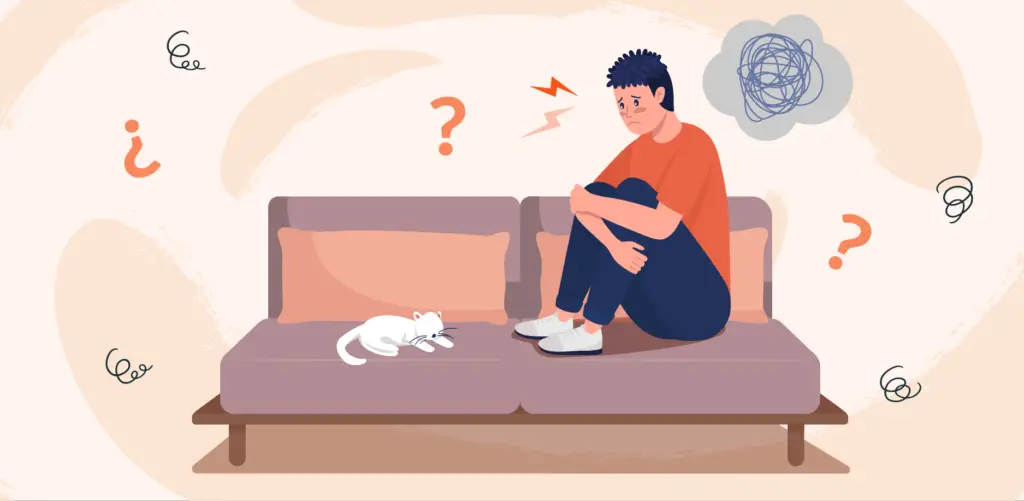



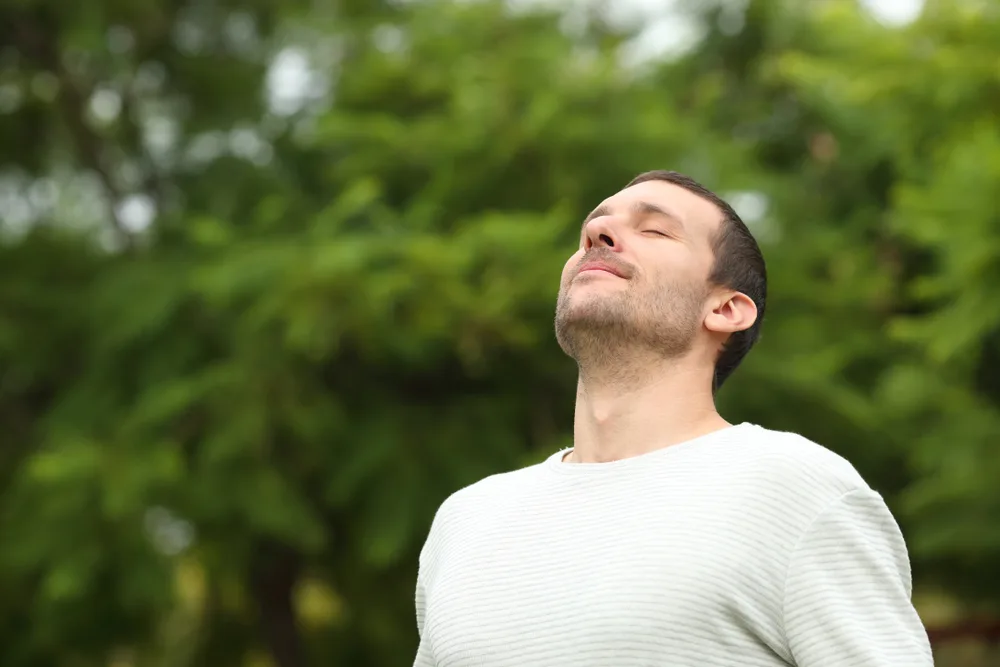
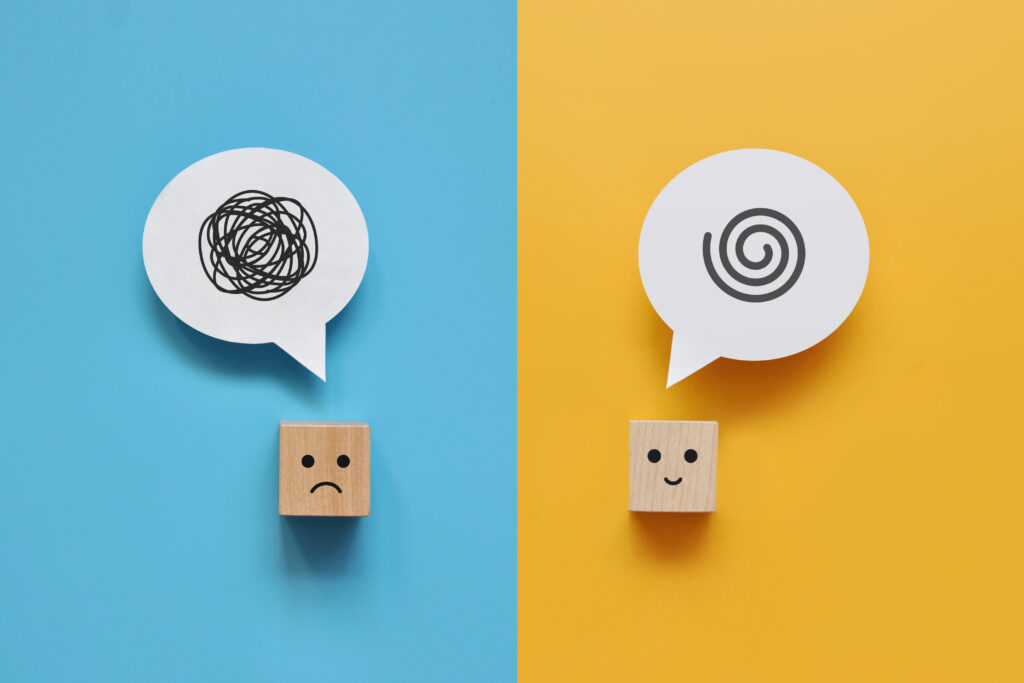


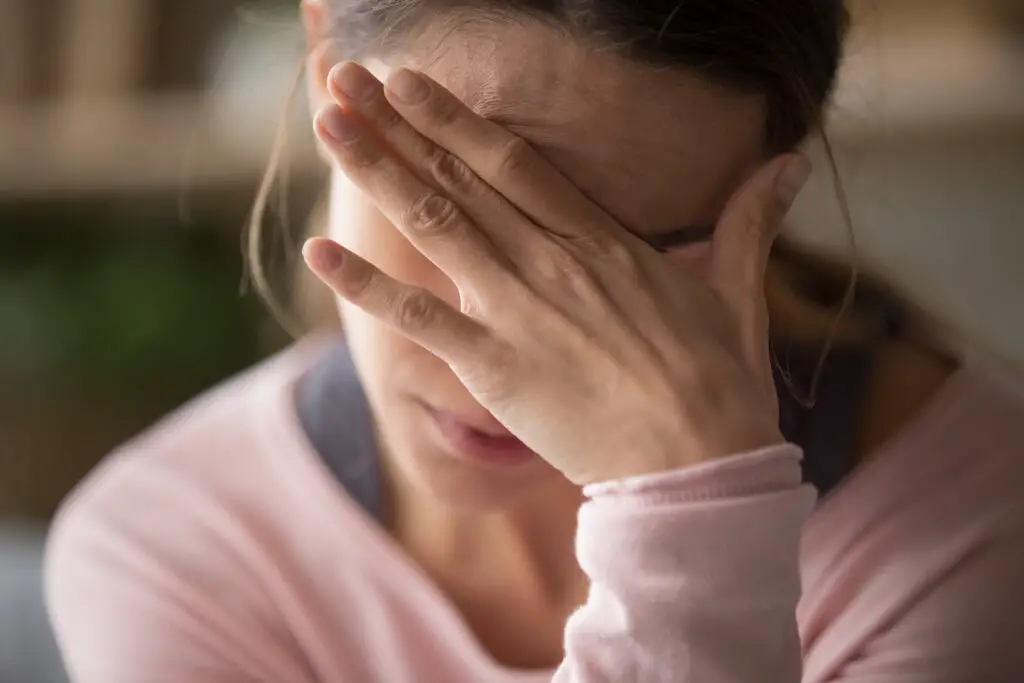



Comments
0